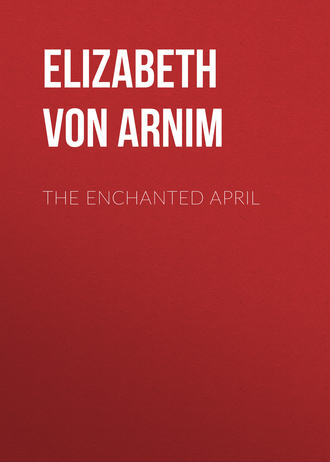 полная версия
полная версияThe Enchanted April
It was a sad sight to see the collapse of Briggs. Everybody noticed it, even Rose.
"Upon my word," thought Mrs. Fisher, "the way one pretty face can turn a delightful man into an idiot is past all patience."
And feeling the air getting chilly, and the sight of the enthralled Briggs painful, she went in to order his room to be got ready, regretting now that she had pressed the poor boy to stay. She had forgotten Lady Caroline's kill-joy face for the moment, and the more completely owing to the absence of any ill effects produced by it on Mr. Wilkins. Poor boy. Such a charming boy too, left to himself. It was true she could not accuse Lady Caroline of not leaving him to himself, for she was taking no notice of him at all, but that did not help. Exactly like foolish moths did men, in other respects intelligent, flutter round the impassive lighted candle of a pretty face. She had seen them doing it. She had looked on only too often. Almost she laid a mother hand on Briggs's fair head as she passed him. Poor boy.
Then Scrap, having finished her cigarette, got up and went indoors too. She saw no reason why she should sit there in order to gratify Mr. Briggs's desire to stare. She would have liked to stay out longer, to go to her corner behind the daphne bushes and look at the sunset sky and watch the lights coming out one by one in the village below and smell the sweet moistness of the evening, but if she did Mr. Briggs would certainly follow her.
The old familiar tyranny had begun again. Her holiday of peace and liberation was interrupted—perhaps over, for who knew if he would go away, after all, to-morrow? He might leave the house, driven out of it by Kate Lumley, but that was nothing to prevent his taking rooms in the village and coming up every day. This tyranny of one person over another! And she was so miserably constructed that she wouldn't even be able to frown him down without being misunderstood.
Scrap, who loved this time of the evening in her corner, felt indignant with Mr. Briggs who was doing her out of it, and she turned her back on the garden and him and went towards the house without a look or a word. But Briggs, when he realized her intention, leapt to his feet, snatched chairs which were not in her way out of it, kicked a footstool which was not in her path on one side, hurried to the door, which stood wide open, in order to hold it open, and followed her through it, walking by her side along the hall.
What was to be done with Mr. Briggs? Well, it was his hall; she couldn't prevent his walking along it.
"I hope," he said, not able while walking to take his eyes off her, so that he knocked against several things he would otherwise have avoided—the corner of a bookcase, an ancient carved cupboard, the table with the flowers on it, shaking the water over—"that you are quite comfortable here? If you're not I'll—I'll flay them alive."
His voice vibrated. What was to be done with Mr. Briggs? She could of course stay in her room the whole time, say she was ill, not appear at dinner; but again, the tyranny of this . . .
"I'm very comfortable indeed," said Scrap.
"If I had dreamed you were coming—" he began.
"It's a wonderful old place," said Scrap, doing her utmost to sound detached and forbidding, but with little hope of success.
The kitchen was on this floor, and passing its door, which was open a crack, they were observed by the servants, whose thoughts, communicated to each other by looks, may be roughly reproduced by such rude symbols as Aha and Oho—symbols which represented and included their appreciation of the inevitable, their foreknowledge of the inevitable, and their complete understanding and approval.
"Are you going upstairs?" asked Briggs, as she paused at the foot of them.
"Yes."
"Which room do you sit in? The drawing-room, or the small yellow room?"
"In my own room."
So then he couldn't go up with her; so then all he could do was to wait till she came out again.
He longed to ask her which was her own room—it thrilled him to hear her call any room in his house her own room—that he might picture her in it. He longed to know if by any happy chance it was his room, for ever after to be filled with her wonder; but he didn't dare. He would find that out later from some one else—Francesca, anybody.
"Then I shan't see you again till dinner?"
"Dinner is at eight," was Scrap's evasive answer as she went upstairs.
He watched her go.
She passed the Madonna, the portrait of Rose Arbuthnot, and the dark-eyed figure he had thought so sweet seemed to turn pale, to shrivel into insignificance as she passed.
She turned the bend of the stairs, and the setting sun, shining through the west window a moment on her face, turned her to glory.
She disappeared, and the sun went out too, and the stairs were dark and empty.
He listened till her footsteps were silent, trying to tell from the sound of the shutting door which room she had gone into, then wandered aimlessly away through the hall again, and found himself back in the top garden.
Scrap from her window saw him there. She saw Lotty and Rose sitting on the end parapet, where she would have liked to have been, and she saw Mr. Wilkins buttonholing Briggs and evidently telling him the story of the oleander tree in the middle of the garden.
Briggs was listening with a patience she thought rather nice, seeing that it was his oleander and his own father's story. She knew Mr. Wilkins was telling him the story by his gestures. Domenico had told it her soon after her arrival, and he had also told Mrs. Fisher, who had told Mr. Wilkins. Mrs. Fisher thought highly of this story, and often spoke of it. It was about a cherrywood walking-stick. Briggs's father had thrust this stick into the ground at that spot, and said to Domenico's father, who was then the gardener, "Here we will have an oleander." And Briggs's father left the stick in the ground as a reminder to Domenico's father, and presently—how long afterwards nobody remembered—the stick began to sprout, and it was an oleander.
There stood poor Mr. Briggs being told all about it, and listening to the story he must have known from infancy with patience.
Probably he was thinking of something else. She was afraid he was. How unfortunate, how extremely unfortunate, the determination that seized people to get hold of and engulf other people. If only they could be induced to stand more on their own feet. Why couldn't Mr. Briggs be more like Lotty, who never wanted anything of anybody, but was complete in herself and respected other people's completeness? One loved being with Lotty. With her one was free, and yet befriended. Mr. Briggs looked so really nice, too. She thought she might like him if only he wouldn't so excessively like her.
Scrap felt melancholy. Here she was shut up in her bedroom, which was stuffy from the afternoon sun that had been pouring into it, instead of out in the cool garden, and all because of Mr. Briggs.
Intolerably tyranny, she thought, flaring up. She wouldn't endure it; she would go out all the same; she would run downstairs while Mr. Wilkins—really that man was a treasure—held Mr. Briggs down telling him about the oleander, and get out of the house by the front door, and take cover in the shadows of the zigzag path. Nobody could see her there; nobody would think of looking for her there.
She snatched up a wrap, for she did not mean to come back for a long while, perhaps not even to dinner—it would be all Mr. Briggs's fault if she went dinnerless and hungry—and with another glance out of the window to see if she were still safe, she stole out and got away to the sheltering trees of the zigzag path, and there sat down on one of the seats placed at each bend to assist the upward journey of those who were breathless.
Ah, this was lovely, thought Scrap with a sigh of relief. How cool. How good it smelt. She could see the quiet water of the little harbour through the pine trunks, and the lights coming out in the houses on the other side, and all round her the green dusk was splashed by the rose-pink of the gladioluses in the grass and the white of the crowding daisies.
Ah, this was lovely. So still. Nothing moving—not a leaf, not a stalk. The only sound was a dog barking, far away somewhere up on the hills, or when the door of the little restaurant in the piazza below was opened and there was a burst of voices, silenced again immediately by the swinging to of the door.
She drew in a deep breath of pleasure. Ah, this was—
Her deep breath was arrested in the middle. What was that?
She leaned forward listening, her body tense.
Footsteps. On the zigzag path. Briggs. Finding her out.
Should she run?
No—the footsteps were coming up, not down. Some one from the village. Perhaps Angelo, with provisions.
She relaxed again. But the steps were not the steps of Angelo, that swift and springy youth; they were slow and considered, and they kept on pausing.
"Some one who isn't used to hills," thought Scrap.
The idea of going back to the house did not occur to her. She was afraid of nothing in life except love. Brigands or murderers as such held no terrors for the daughter of the Droitwiches; she only would have been afraid of them if they left off being brigands and murderers and began instead to try and make love.
The next moment the footsteps turned the corner of her bit of path, and stood still.
"Getting his wind," thought Scrap, not looking round.
Then as he—from the sounds of the steps she took them to belong to a man—did not move, she turned her head, and beheld with astonishment a person she had seen a good deal of lately in London, the well-known writer of amusing memoirs, Mr. Ferdinand Arundel.
She stared. Nothing in the way of being followed surprised her any more, but that he should have discovered where she was surprised her. Her mother had promised faithfully to tell no one.
"You?" she said, feeling betrayed. "Here?"
He came up to her and took off his hat. His forehead beneath the hat was wet with the beads of unaccustomed climbing. He looked ashamed and entreating, like a guilty but devoted dog.
"You must forgive me," he said. "Lady Droitwich told me where you were, and as I happened to be passing through on my way to Rome I thought I would get out at Mezzago and just look in and see how you were."
"But—didn't my mother tell you I was doing a rest-cure?"
"Yes. She did. And that's why I haven't intruded on you earlier in the day. I thought you would probably sleep all day, and wake up about now so as to be fed."
"But—"
"I know. I've got nothing to say in excuse. I couldn't help myself."
"This," thought Scrap, "comes of mother insisting on having authors to lunch, and me being so much more amiable in appearance than I really am."
She had been amiable to Ferdinand Arundel; she liked him—or rather she did not dislike him. He seemed a jovial, simple man, and had the eyes of a nice dog. Also, though it was evident that he admired her, he had not in London grabbed. There he had merely been a good-natured, harmless person of entertaining conversation, who helped to make luncheons agreeable. Now it appeared that he too was a grabber. Fancy following her out there—daring to. Nobody else had. Perhaps her mother had given him the address because she considered him so absolutely harmless, and thought he might be useful and see her home.
Well, whatever he was he couldn't possibly give her the trouble an active young man like Mr. Briggs might give her. Mr. Briggs, infatuated, would be reckless, she felt, would stick at nothing, would lose his head publicly. She could imagine Mr. Briggs doing things with rope-ladders, and singing all night under her window—being really difficult and uncomfortable. Mr. Arundel hadn't the figure for any kind of recklessness. He had lived too long and too well. She was sure he couldn't sing, and wouldn't want to. He must be at least forty. How many good dinners could not a man have eaten by the time he was forty? And if during that time instead of taking exercise he had sat writing books, he would quite naturally acquire the figure Mr. Arundel had in fact acquired—the figure rather for conversation than adventure.
Scrap, who had become melancholy at the sight of Briggs, became philosophical at the sight of Arundel. Here he was. She couldn't send him away till after dinner. He must be nourished.
This being so, she had better make the best of it, and do that with a good grace which anyhow wasn't to be avoided. Besides, he would be a temporary shelter from Mr. Briggs. She was at least acquainted with Ferdinand Arundel, and could hear news from him of her mother and her friends, and such talk would put up a defensive barrier at dinner between herself and the approaches of the other one. And it was only for one dinner, and he couldn't eat her.
She therefore prepared herself for friendliness. "I'm to be fed," she said, ignoring his last remark, "at eight, and you must come up and be fed too. Sit down and get cool and tell me how everybody is."
"May I really dine with you? In these travelling things?" he said, wiping his forehead before sitting down beside her.
She was too lovely to be true, he thought. Just to look at her for an hour, just to hear her voice, was enough reward for his journey and his fears.
"Of course. I suppose you've left your fly in the village, and will be going on from Mezzago by the night train."
"Or stay in Mezzago in an hotel and go on to-morrow. But tell me," he said, gazing at the adorable profile, "about yourself. London has been extraordinarily dull and empty. Lady Droitwich said you were with people here she didn't know. I hope they've been kind to you? You look—well, as if your cure had done everything a cure should."
"They've been very kind," said Scrap. "I got them out of an advertisement."
"An advertisement?"
"It's a good way, I find, to get friends. I'm fonder of one of these than I've been of anybody in years."
"Really? Who is it?"
"You shall guess which of them it is when you see them. Tell me about mother. When did you see her last? We arranged not to write to each other unless there was something special. I wanted to have a month that was perfectly blank."
"And now I've come and interrupted. I can't tell you how ashamed I am—both of having done it and of not having been able to help it."
"Oh, but," said Scrap quickly, for he could not have come on a better day, when up there waiting and watching for her was, she knew, the enamoured Briggs, "I'm really very glad indeed to see you. Tell me about mother."
Chapter 20
Scrap wanted to know so much about her mother that Arundel had presently to invent. He would talk about anything she wished if only he might be with her for a while and see her and hear her, but he knew very little of the Droitwiches and their friends really—beyond meeting them at those bigger functions where literature is also represented, and amusing them at luncheons and dinners, he knew very little of them really. To them he had always remained Mr. Arundel; no one called him Ferdinand; and he only knew the gossip also available to the evening papers and the frequenters of clubs. But he was, however, good at inventing; and as soon as he had come to an end of first-hand knowledge, in order to answer her inquires and keep her there to himself he proceeded to invent. It was quite easy to fasten some of the entertaining things he was constantly thinking on to other people and pretend they were theirs. Scrap, who had that affection for her parents which warms in absence, was athirst for news, and became more and more interested by the news he gradually imparted.
At first it was ordinary news. He had met her mother here, and seen her there. She looked very well; she said so and so. But presently the things Lady Droitwich had said took on an unusual quality: they became amusing.
"Mother said that?" Scrap interrupted, surprised.
And presently Lady Droitwich began to do amusing things as well as say them.
"Mother did that?" Scrap inquired, wide-eyed.
Arundel warmed to his work. He fathered some of the most entertaining ideas he had lately had on to Lady Droitwich, and also any charming funny things that had been done—or might have been done, for he could imagine almost anything.
Scrap's eyes grew round with wonder and affectionate pride in her mother. Why, but how funny–fancy mother. What an old darling. Did she really do that? How perfectly adorable of her. And did she really say—but how wonderful of her to think of it. What sort of a face did Lloyd George make?
She laughed and laughed, and had a great longing to hug her mother, and the time flew, and it grew quite dusk, and it grew nearly dark, and Mr. Arundel still went on amusing her, and it was a quarter to eight before she suddenly remembered dinner.
"Oh, good heavens!" she exclaimed, jumping up.
"Yes. It's late," said Arundel.
"I'll go on quickly and send the maid to you. I must run, or I'll never be ready in time—"
And she was gone up the path with the swiftness of a young, slender deer.
Arundel followed. He did not wish to arrive too hot, so had to go slowly. Fortunately he was near the top, and Francesca came down the pergola to pilot him indoors, and having shown him where he could wash she put him in the empty drawing-room to cool himself by the crackling wood fire.
He got as far away from the fire as he could, and stood in one of the deep window-recesses looking out at the distant lights of Mezzago. The drawing-room door was open, and the house was quiet with the hush that precedes dinner, when the inhabitants are all shut up in their rooms dressing. Briggs in his room was throwing away spoilt tie after spoilt tie; Scrap in hers was hurrying into a black frock with a vague notion that Mr. Briggs wouldn't be able to see her so clearly in black; Mrs. Fisher was fastening the lace shawl, which nightly transformed her day dress into her evening dress, with the brooch Ruskin had given her on her marriage, formed of two pearl lilies tied together by a blue enamel ribbon on which was written in gold letters Esto perpetua; Mr. Wilkins was sitting on the edge of his bed brushing his wife's hair— thus far in this third week had he progressed in demonstrativeness— while she, for her part, sitting on a chair in front of him, put his studs in a clean shirt; and Rose, ready dressed, sat at her window considering her day.
Rose was quite aware of what had happened to Mr. Briggs. If she had had any difficulty about it, Lotty would have removed it by the frank comments she made while she and Rose sat together after tea on the wall. Lotty was delighted at more love being introduced into San Salvatore, even if it were only one-sided, and said that when once Rose's husband was there she didn't suppose, now that Mrs. Fisher too had at last come unglued—Rose protested at the expression, and Lotty retorted that it was in Keats—there would be another place in the world more swarming with happiness than San Salvatore.
"Your husband," said Lotty, swinging her feet, "might be here quite soon, perhaps to-morrow evening if he starts at once, and there'll be a glorious final few days before we all go home refreshed for life. I don't believe any of us will ever be the same again—and I wouldn't be a bit surprised if Caroline doesn't end by getting fond of the young man Briggs. It's in the air. You have to get fond of people here."
Rose sat at her window thinking of these things. Lotty's optimism . . . yet it had been justified by Mr. Wilkins; and look, too, at Mrs. Fisher. If only it would come true as well about Frederick! For Rose, who between lunch and tea had left off thinking about Frederick, was now, between tea and dinner, thinking of him harder than ever.
It has been funny and delightful, that little interlude of admiration, but of course it couldn't go on once Caroline appeared. Rose knew her place. She could see as well as any one the unusually, the unique loveliness of Lady Caroline. How warm, though, things like admiration and appreciation made one feel, how capable of really deserving them, how different, how glowing. They seemed to quicken unsuspected faculties into life. She was sure she had been a thoroughly amusing woman between lunch and tea, and a pretty one too. She was quite certain she had been pretty; she saw it in Mr. Briggs's eyes as clearly as in a looking-glass. For a brief space, she thought, she had been like a torpid fly brought back to gay buzzing by the lighting of a fire in a wintry room. She still buzzed, she still tingled, just at the remembrance. What fun it had been, having an admirer even for that little while. No wonder people liked admirers. They seemed, in some strange way, to make one come alive.
Although it was all over she still glowed with it and felt more exhilarated, more optimistic, more as Lotty probably constantly felt, than she had done since she was a girl. She dressed with care, though she knew Mr. Briggs would no longer see her, but it gave her pleasure to see how pretty, while she was about it, she could make herself look; and very nearly she stuck a crimson camellia in her hair down by her ear. She did hold it there for a minute, and it looked almost sinfully attractive and was exactly the colour of her mouth, but she took it out again with a smile and a sigh and put it in the proper place for flowers, which is water. She mustn't be silly, she thought. Think of the poor. Soon she would be back with them again, and what would a camellia behind her ear seem like then? Simply fantastic.
But on one thing she was determined: the first thing she would do when she got home would be to have it out with Frederick. If he didn't come to San Salvatore that is what she would do—the very first thing. Long ago she ought to have done this, but always she had been handicapped, when she tried to, by being so dreadfully fond of him and so much afraid that fresh wounds were going to be given her wretched, soft heart. But now let him wound her as much as he chose, as much as he possibly could, she would still have it out with him. Not that he ever intentionally wounded her; she knew he never meant to, she knew he often had no idea of having done it. For a person who wrote books, thought Rose, Frederick didn't seem to have much imagination. Anyhow, she said to herself, getting up from the dressing-table, things couldn't go on like this. She would have it out with him. This separate life, this freezing loneliness, she had had enough of it. Why shouldn't she too be happy? Why on earth—the energetic expression matched her mood of rebelliousness—shouldn't she too be loved and allowed to love?
She looked at her little clock. Still ten minutes before dinner.
Tired of staying in her bedroom she thought she would go on to Mrs. Fisher's battlements, which would be empty at this hour, and watch the moon rise out of the sea.
She went into the deserted upper hall with this intention, but was attracted on her way along it by the firelight shining through the open door of the drawing-room.
How gay it looked. The fire transformed the room. A dark, ugly room in the daytime, it was transformed just as she had been transformed by the warmth of—no, she wouldn't be silly; she would think of the poor; the thought of them always brought her down to sobriety at once.
She peeped in. Firelight and flowers; and outside the deep slits of windows hung the blue curtain of the night. How pretty. What a sweet place San Salvatore was. And that gorgeous lilac on the table— she must go and put her face in it . . .
But she never got to the lilac. She went one step towards it, and then stood still, for she had seen the figure looking out of the window in the farthest corner, and it was Frederick.
All the blood in Rose's body rushed to her heart and seemed to stop its beating.
She stood quite still. He had not heard her. He did not turn round. She stood looking at him. The miracle had happened, and he had come.
She stood holding her breath. So he needed her, for he had come instantly. So he too must have been thinking, longing . . .
Her heart, which had seemed to stop beating, was suffocating her now, the way it raced along. Frederick did love her then—he must love her, or why had he come? Something, perhaps her absence, had made him turn to her, want her . . . and now the understanding she had made up her mind to have with him would be quite—would be quite—easy—









